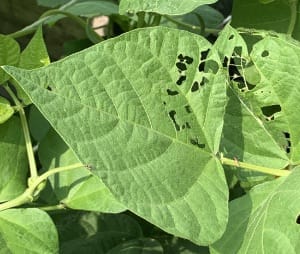by Tommy Underhill, GreenTech Heat
July 25, 2021
![GreenTech Heat bed bug heater packages for sale kill bed bugs better than sprays]() The other day I was harvesting vegetables from my garden and noticed some insect had been eating my green bean leaves. I have a couple of grape vines along the back fence and the brown Japanese beetles are a constant pest leaving the leaves a lattice of brown lace. The damage on these bean leaves looked a bit like what I was seeing on the grapes. The Japanese beetles love to consume my rose blooms, too.
The other day I was harvesting vegetables from my garden and noticed some insect had been eating my green bean leaves. I have a couple of grape vines along the back fence and the brown Japanese beetles are a constant pest leaving the leaves a lattice of brown lace. The damage on these bean leaves looked a bit like what I was seeing on the grapes. The Japanese beetles love to consume my rose blooms, too.
I moved from picking beans to harvesting zucchini. As I was poking through the big leaves, searching for squash, I started seeing a lot of earwigs. Many more than I’ve seen in years past.
While I’ve used electric bed bug heater to keep my garden warm during an early-season blizzard, I know there is no way to use heat to kill the beetles, earwigs, aphids, or other insects on the plants in my garden and protect my vegetable plants at the same time— the heat would indiscriminately kill plants and bugs. Professional-grade propane bed bug heaters work great to exterminate stored food pests, they just won’t do the job in the garden or greenhouse. I don’t like using pesticides in my garden and use them sparingly in and around my house (I have a very nosy dog that loves new smells), so I deal with the Japanese beetles by knocking them off the leaves into a container of soapy water. I generally do this twice a day and find it mentally therapeutic and physically relaxing.
Why would I ask if earwigs eat bed bugs?
Here is where the story gets interesting.
I don’t have a lot of experience with earwigs. I usually don’t see them in the house, and generally their numbers are not great enough to worry about in the garden. I also haven’t seen many signs of insects feeding on my zucchini. So I turned to the internet to learn a bit about these insects. As expected, they’re opportunistic omnivores— they’ll eat just about anything from fruits, vegetables, and flowers, to other insects, to dead leaf material.
What I was surprised to find online was the number of times the question “Do earwigs eat bed bugs?” showed up. I guess it kinda makes sense if earwigs will eat other insects like aphids, mites, and old insects. In this instance they are helpful garden predators. I never would have thought to connect earwigs with eating bed bugs since I don’t find earwigs in my home and bed bugs don’t live in gardens. In my mind, the chance of these two insects coming together is minimal.
Earwigs living inside a home could be a different story. Scientific studies indicate that earwigs can consume bugs. But the empirical proof that earwigs feed on bed bugs “in the wild” is not certain. The most common bed bug predators are cockroaches, spiders, centipedes, masked hunters, and even several kinds of ants. When it comes to animals, the only noted natural enemies of bed bugs are several species of lizards including geckos.
In some parts of the world, geckos are the major pest and a call to the gecko exterminator can be a common occurrence.
Bed bug heat equipment is more effective
I do not recommend introducing predatory insects or geckos into your home to deal with a bed bug infestation. There is a safe technology with years of proof from millions of successful bed bug treatments: GreenTech Heat equipment.
No traditional chemical treatment or do-it-yourself bed bug spray can match the results you will achieve with a professional bed bug heat extermination from Armor & Shield.
No other bed bug exterminator in the entire Oklahoma City Metro Area including the communities of Bethany, Bristow, Broken Arrow, Chandler, Edmond, Guthrie, McLoud, Norman, Oklahoma City, Shawnee, Tulsa, and Midwest City can match the results you will achieve when you call Armor & Shield at 405-698-6090— and we prove this every day.
Don’t take our word for it
They provided one of the best pest control services that I have known in my lifetime. They have a pleasant and communicative staff who give great attention to every little issue. Highly recommend them.
 Collins Evans
Collins Evans
5 Stars: ★ ★ ★ ★ ★
January 6 2021

 The other day I was harvesting vegetables from my garden and noticed some insect had been eating my green bean leaves. I have a couple of grape vines along the back fence and the brown Japanese beetles are a constant pest leaving the leaves a lattice of brown lace. The damage on these bean leaves looked a bit like what I was seeing on the grapes. The Japanese beetles love to consume my rose blooms, too.
The other day I was harvesting vegetables from my garden and noticed some insect had been eating my green bean leaves. I have a couple of grape vines along the back fence and the brown Japanese beetles are a constant pest leaving the leaves a lattice of brown lace. The damage on these bean leaves looked a bit like what I was seeing on the grapes. The Japanese beetles love to consume my rose blooms, too.



